AI ticketing systems in 2025: A guide to artificial intelligence tickets

What is AI ticketing?
AI ticketing is the use of artificial intelligence (AI) technology to streamline and automate customer service to optimize the management of customer support tickets.
Instead of human agents having to manually categorize, route, and respond to each ticket, support teams can use AI-powered ticketing systems to automate various parts of the ticketing process.
For example, while a traditional ticketing system relies on human agents to categorize, route, and manage tickets, AI ticketing systems use machine learning (ML) and AI agents (the next generation of AI chatbots) to automate various support tasks and reduce the reliance on human intervention. For example, AI ticketing can:
Automatically categoriz tickets based on the content of inquiries
Prioritize tickets based on urgency
Generate automated responses for common issues
By automating these previously manual tasks, support teams can significantly reduce the workload of human agents, freeing them to focus on more complex tasks. This leads to more streamlined support operations, greater customer satisfaction, and lower costs.

In this article, we will discuss AI ticketing for customer service and compare it to traditional customer service ticketing. We’ll also talk about the capabilities of AI ticketing systems and various industry use cases.
What is an AI ticketing system?
An AI ticketing system is a software solution that uses artificial intelligence technology like machine learning (ML) to automate and optimize the ticketing process of customer support, from initial request to resolution.
These AI-driven systems can handle tasks like ticket categorization, routing, prioritization, and even initial responses. This frees up human agents to handle more complex issues, helping to streamline support operations and cut costs.

Automate customer service with AI agents
Why is an AI ticketing system important?
60% of today’s consumers say that it’s very important to receive a customer service response of 10 minutes or less when they need assistance. This level of responsiveness is hard to achieve for businesses with a large customer base, and even more difficult to deliver consistently.
Furthermore, the level of manual labor that traditional ticketing systems require makes it challenging for customer service teams to satisfy the growing demand for quick resolutions. With 75% of consumers ranking fast response time as the most important aspect of the customer experience, companies that can’t consistently deliver on these expectations risk decreased customer satisfaction — and ultimately, higher customer attrition and decreased ARR. Indeed, companies that use AI in customer service have seen up to a 20% boost in customer satisfaction.
An AI ticketing system can help meet modern consumer demands. By automating the initial stages of ticket resolution, including categorizing and sorting inquiries and providing immediate responses for common issues, artificial intelligence tickets dramatically improve the efficiency of customer support teams. Since AI systems operate 24/7, businesses can provide consistent, always-available AI customer service, which is particularly valuable for global companies with customer bases across regions and time zones.
While AI ticketing has applications across a range of industries, including ITSM and HR, it offers notable value in the sphere of customer service. With AI ticketing systems, human customer service teams can manage higher volumes of inquiries and maintain, or even improve, the quality and speed of responses.

3 challenges of traditional ticketing systems
Traditional ticketing systems present several challenges that can lead to a poor customer experience:
High manual workload: Customer service agents need to manually sort and route each ticket, which can lead to delays and errors. This can be particularly problematic during peak hours or high-volume seasons like the holidays — leading to a backlog in tickets and causing customers to become frustrated.
Limited scalability: Manual ticketing may work for smaller companies to a certain extent, but as customer inquiries grow, it’s tough for traditional systems to keep up. This can cause more errors and inconsistent customer experiences.
Poor ticket data visibility: Traditional systems also lack the ability to analyze trends in customer issues or agent performance effectively, making it harder for businesses to identify recurring issues or inefficiencies.
The solution: AI ticketing
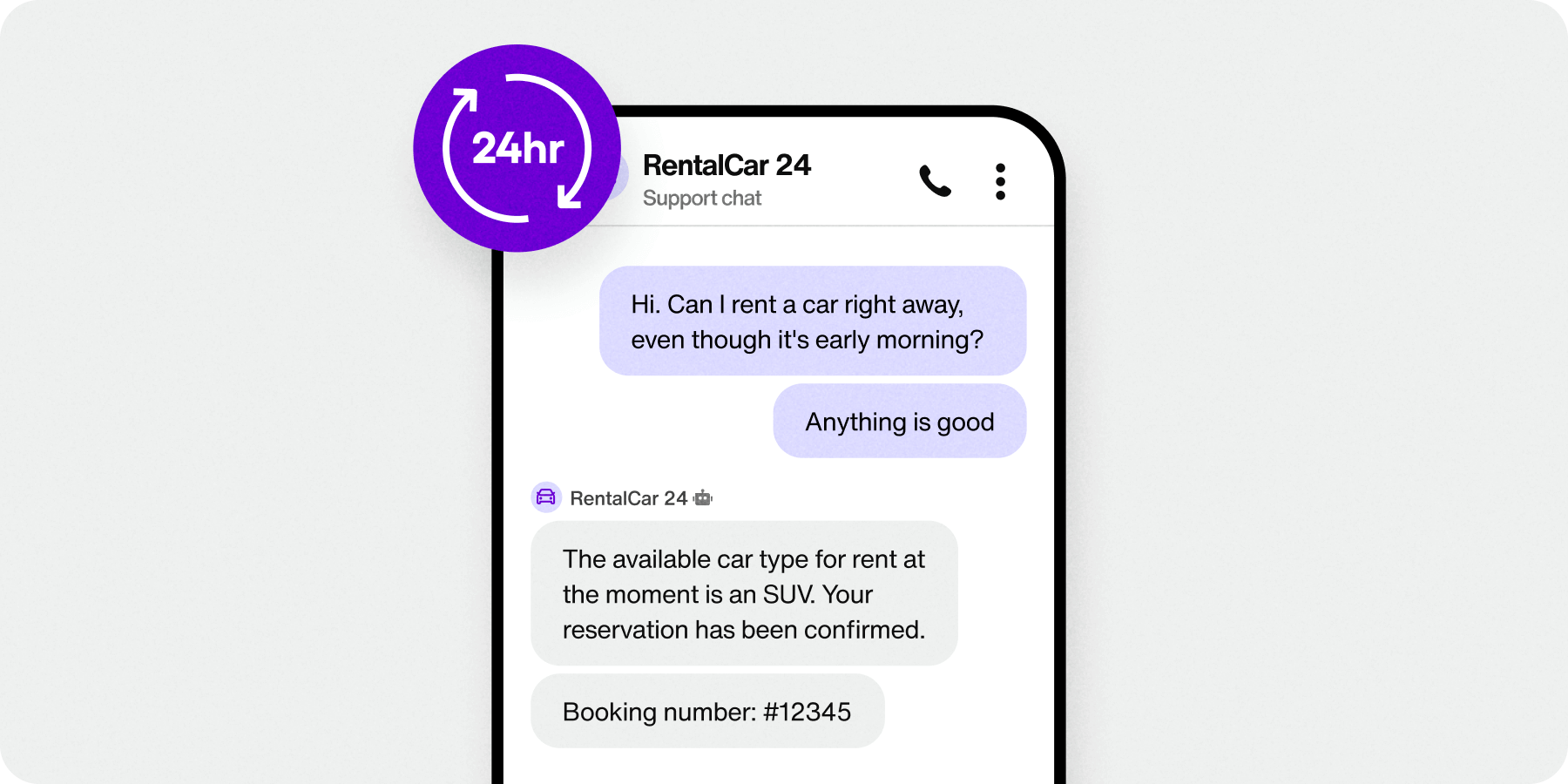
4 benefits of using an AI ticketing system
Four of the benefits of incorporating AI ticketing into your customer service strategy include:
Speedier response times and issue resolution: Tickets are instantly categorized and routed to the appropriate department. Moreover, since an AI agent or chatbot provides immediate responses to common customer inquiries, this cuts down on wait times. For example, IBM found that customers using Watson Assistant have reduced their response time by 70%.
Reduced manual workload for human agents: AI ticketing systems automate a large portion of the repetitive, time-consuming tasks that human agents used to handle, allowing support teams to focus on more complex, high-value tasks. The combination of AI automation and targeted human agent intervention leads to higher productivity and job satisfaction for support agents.
Consistent, personalized customer experiences: Consistency is a huge benefit of AI ticketing since companies can train the system to follow specific brand and communication guidelines. In addition, the AI tool analyzes customer data and past interactions to personalize responses to each customer’s unique situation.
Improved ticket data analytics and reporting: Businesses can access rich data insights that help inform customer service improvements over time. This makes it easier for customer service teams to identify patterns and adjust their strategies accordingly.

Leverage omnichannel AI for customer support
How AI ticketing systems work
Here’s a more detailed breakdown of how AI ticketing systems work:
Intelligent ticket routing and categorization: AI algorithms automatically analyze ticket content to assign categories, prioritize urgency, and route tickets to the most suitable agents or departments, ensuring faster and more accurate handling.
Natural Language Processing (NLP) for enhanced understanding: NLP enables AI to understand the intent and sentiment in ticket messages, which helps prioritize tickets based on customer emotions or urgency, improving the overall response approach.
Automated responses for common issues: AI-powered agents or virtual assistants provide instant responses to frequently asked questions. AI chatbots also handle simple issues like password resets, order status, or shipping updates and can guide customers through troubleshooting steps. This reduces the workload on agents since the AI system handles repetitive or straightforward inquiries.
Predictive analytics for trend and escalation insights: AI systems analyze historical data to forecast common issues and identify patterns, helping support teams proactively manage resources, anticipate ticket volumes, and prepare for potential escalations.
Continuous learning and improvement: With machine learning, AI ticketing systems constantly improve their accuracy in routing, categorization, and response recommendations by learning from new data and feedback, thereby enhancing efficiency and customer satisfaction over time.
Customer service AI ticketing systems combine several core technologies to help speed up the process of responding to customer queries. Here is more information about the tech behind managing the automation of artificial intelligence tickets:
Natural Language Processing (NLP): NLP analyzes the text in customers’ messages and tickets, enabling the AI system to interpret and comprehend inquiries in real-time based on cues, including keywords and customer sentiment. The abilities of NLP allow the AI ticketing system to comprehend a wide range of customer issues, even when they’re phrased in different ways.
Machine Learning (ML) algorithms: By analyzing historical ticketing data, machine learning enables AI ticketing systems to learn from past interactions to increase accuracy in categorizing and routing tickets continuously. As the system handles more tickets, it gets even better at predicting which agent or department should handle specific inquiries, minimizing errors and delays.
Integration with other customer service tools: Many AI ticketing systems integrate with other customer service tools like a CRM or live chat platforms, allowing for a more unified workflow. Whether you need to quickly hand off an AI chat to a live agent or document a customer interaction in your CRM, these integrations save additional time while ensuring data accuracy. For example, Sendbird’s Salesforce connector integrates AI chatbots directly into the platform, moving fluidly between chatbots and live agents and enabling a smoother customer experience.
For industries in which efficiency and fast response times are critical, like ecommerce and healthcare, AI ticketing is a valuable tool for delivering exceptional customer service.

Boost CSAT with proactive AI customer service
Challenges of AI ticketing (+solutions)
Like any technology, AI ticketing comes with certain challenges that businesses need to plan for ahead of implementation:
Integration with existing workflows: It’s critical for AI ticketing systems to integrate smoothly with your company’s existing ticketing workflows. Make sure to:
Assess your current ticketing processes and pinpoint areas where AI can add value.
Select AI tools that align with your specific use cases. For example, NLP can understand natural language to help the system categorize and prioritize tickets, while AI agents can automate common automation inquiries.
Train your AI models on first-party data and prior ticket data to help the system understand the unique context and details around your customers’ inquiries.
Run tests in a controlled environment before fully deploying the new system to avoid any operational disruptions.
Managing customer expectations: It’s critical to be as transparent as possible and help customers understand exactly what to expect from AI-powered support. Some customers may be wary of interacting with AI because of expectations around its lack of human empathy or problem-solving skills. You can manage this by:
Developing clear guidelines for when and how your company will use AI in customer support.
Communicating these guidelines to customers across multiple channels prior to rolling out the new AI system.
Putting clear communication strategies in place to update customers whenever your AI technology, processes, or policies change.
Incorporating on-page notifications to inform customers when they’re interacting with AI.
Maintaining a human touch: An effective customer service program combines AI efficiency with human intervention to ensure customers feel seen, heard, and understood. It’s important not to lose the human touch after introducing AI ticketing systems. Focus on:
Setting up the system for seamless handoffs between AI and human agents based on specific cues like issue complexity or high customer frustration levels (based on customer sentiment analysis).
Training AI models to align with your brand’s tone of voice to help AI interactions feel more personal and in line with your company’s customer service ethos.
Use cases for AI ticketing systems
Artificial intelligence tickets and ticketing systems are particularly valuable for companies in sectors where efficient, high-quality customer service is essential to the customer experience. Five industries that are effectively incorporating AI ticketing systems into their service operations include:
1. Ecommerce

Today, shoppers expect rapid answers to questions about products, order status, shipping, and returns. With AI ticketing systems, ecommerce retailers can:
Automate responses to common queries, helping reduce wait times and improving the customer experience.
Use machine learning to categorize tickets for faster routing and resolution.
By helping customers get the answers they need quickly, AI ticketing enables ecommerce companies to maintain high service quality even during high-traffic periods like Black Friday or Cyber Monday.
2. Retail

Similar to ecommerce, AI ticketing for retail brands automates repetitive tasks like order tracking and inventory inquiries, enabling support teams to handle more complex queries like product customization requests or in-store pickup issues.
3. Healthcare
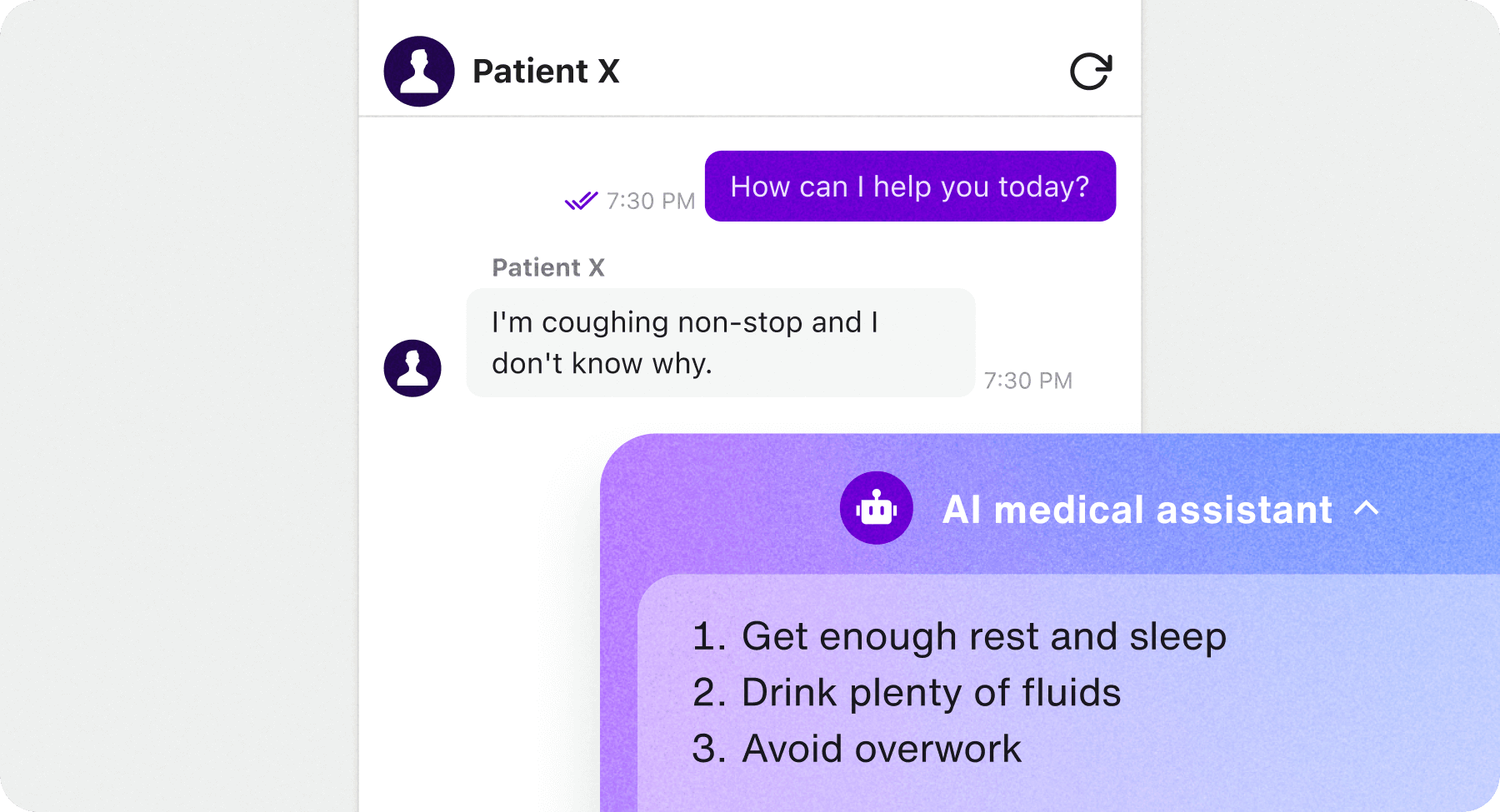
In the healthcare industry, AI ticketing systems have ideal applications for patient support and administrative tasks. Patients often reach out about appointment scheduling, billing, and insurance claims. AI ticketing systems can streamline these processes by:
Automatically routing patient inquiries to the appropriate departments, from billing to scheduling
Providing immediate responses to common questions, such as queries regarding appointment changes
Prioritizing urgent tickets like refill requests or medical advice
Using AI ticket technology, healthcare providers can reduce response times and improve patient satisfaction.
4. Customer service
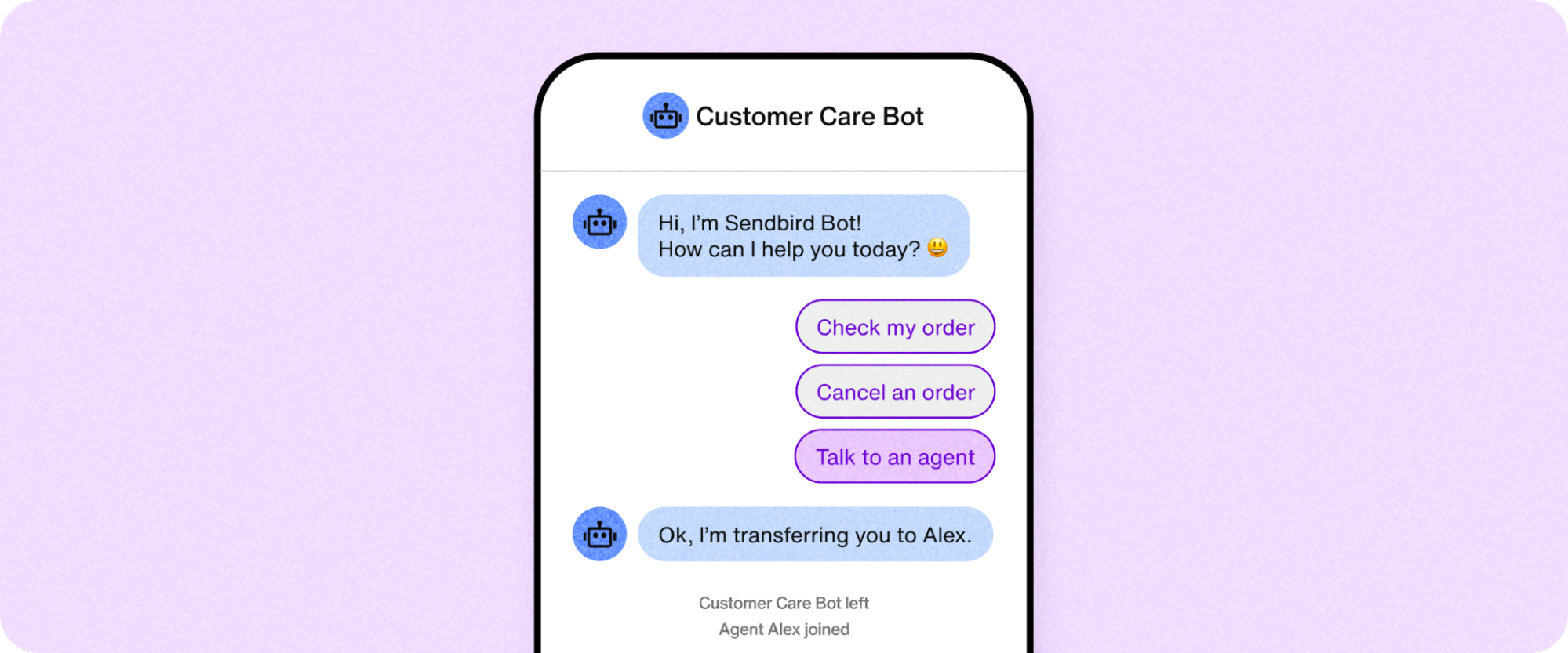
Customer service businesses that handle a wide range of inquiries across different sectors enjoy significant efficiencies with AI ticketing systems. These systems are especially beneficial for companies with global operations across various time zones. Capabilities that are particularly useful for customer service teams include:
Streamlining the management of high-ticket volumes
Automating ticket triage to give attention to high-priority issues first
Resolving common inquiries like password resets or FAQs through automation
24/7 support to address inquiries in real-time across regions and time zones
These AI ticketing features help maintain consistent customer experiences regardless of the time zone or agent.
5. Real estate
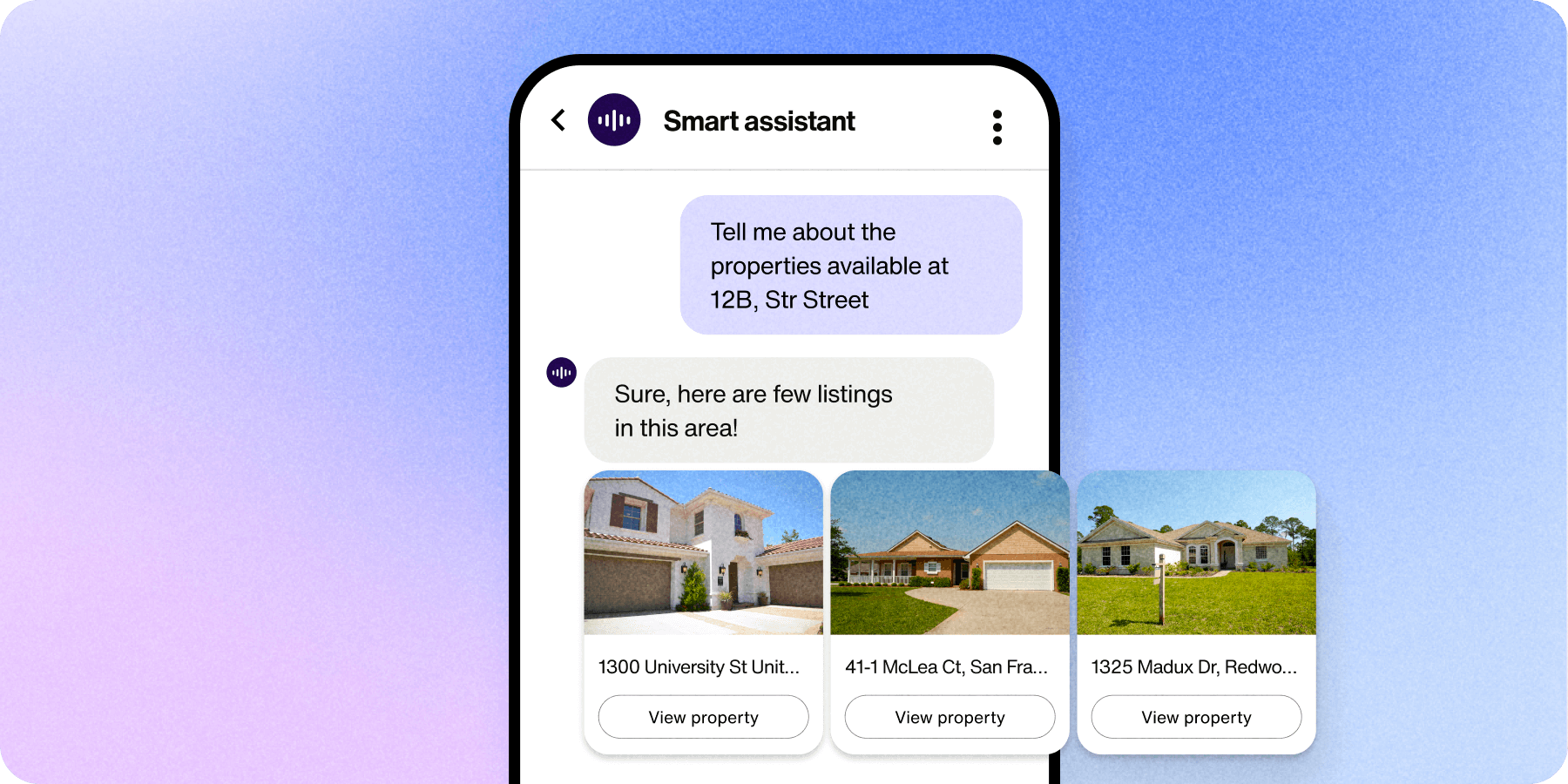
From property management to residential or commercial sales, real estate companies often deal with a high volume of inquiries — including property availability, tour scheduling, rental terms, pricing, and contract details. AI ticketing systems help real estate businesses manage these queries more effectively by:
Automatically categorizing and routing them based on the nature of the question
Assisting with lead qualification to quickly identify serious prospects and route them to human agents for follow-up
Responding to more general inquiries with pre-programmed responses
In an industry where timing is crucial, AI ticketing automation increases the chances of securing high-value sales.

Reinvent CX with AI agents
Top 5 AI ticketing tools to streamline artificial intelligence tickets
The 5 most competitive AI ticketing tools to consider for your business include:
1. Sendbird
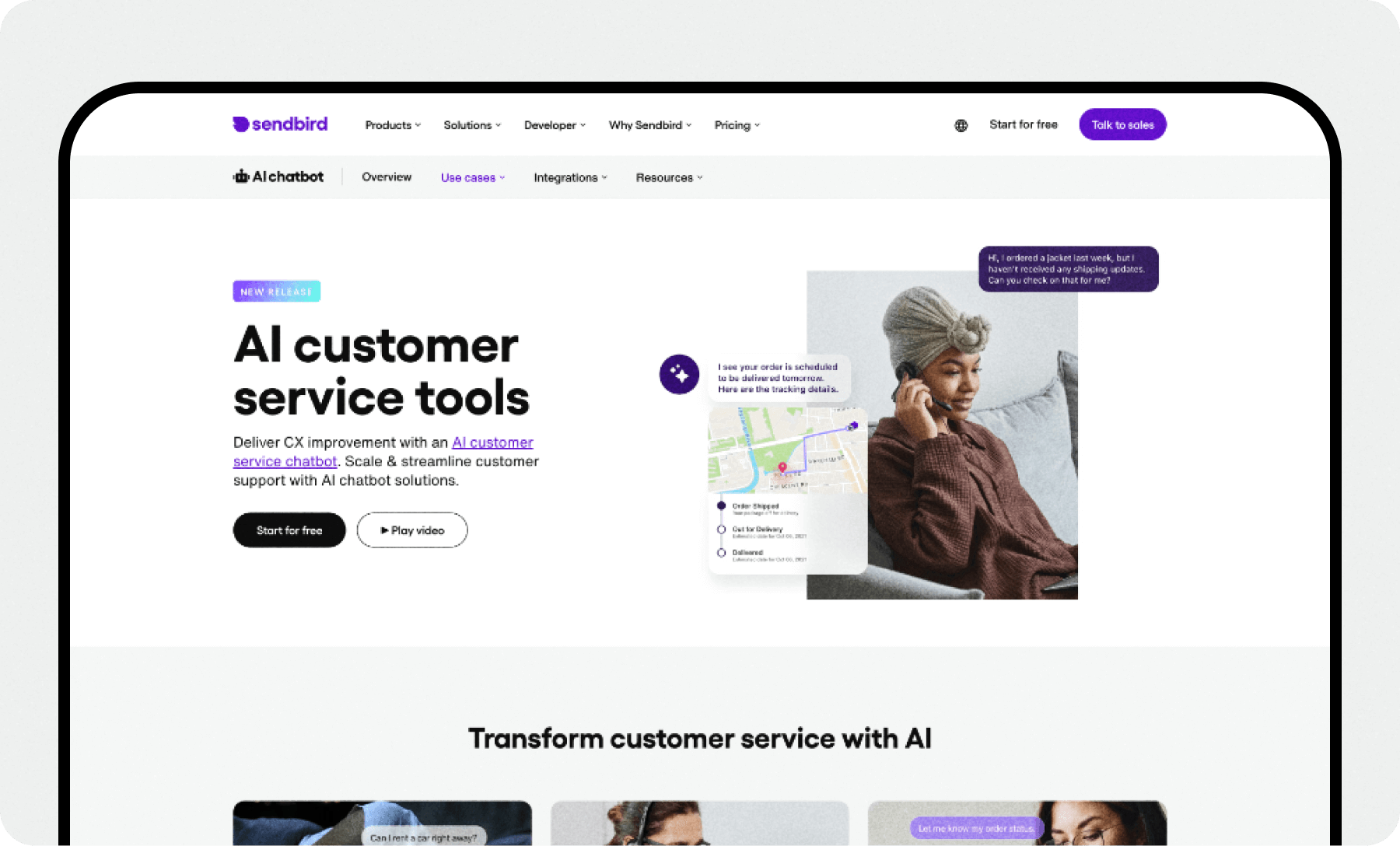
Sendbird offers AI agents that can handle a wide range of customer service tasks including FAQs, order tracking, and account issues. Leveraging numerous different LLMs, Sendbird’s AI agent builder and agents are more robust than many competitors. Their AI ticketing tools allow businesses across sectors to offer efficient and round-the-clock customer support.
Main features
Some of the standout features of Sendbird’s AI customer experience platform include:
Multilingual capabilities: AI concierges can chat in different languages, which is great for global businesses
Automated ticket resolution for routine queries
Customizable chatbot behavior to align with a brand’s tone and style
24/7 support capabilities for real-time assistance at any time across the globe
Scalability for easily handling increasing ticket volumes without adding staff
Seamless handoff to human agents when queries are too complex
Pros
Saves time: Routine query handling allows human agents to focus on more complex requests
Reduced staffing requirements help businesses save money on support costs
Handles fluctuating ticket volumes: Can handle sudden spikes in customer inquiries without bottlenecks or delays
Integrates with Salesforce for better customer insights
Integrates with various LLMs for more precise customization based on enterprise requirements.
Cons
As with any AI offering, not everyone feels comfortable interacting with computers. Some customers might prefer human interaction.
Complex issues will likely still require human intervention.
There’s always a learning curve when implementing new technology.
Pricing
Consumption-based pricing and volume discounts as you scale. Contact sales for more details.

Harness proactive AI customer support
2. Zendesk

Zendesk AI relies on ML and NLP to help businesses efficiently manage high volumes of support requests. Their customer service AI system leverages Open AI LLMs in combination with their own proprietary models.
Main features
AI-powered ticketing: Automatically categorizes, prioritizes, and routes support tickets to the appropriate agents or departments.
Answer bot: Uses NLP to deliver instant, relevant answers to customer queries, resolving common questions immediately.
Automated workflows: Reduces manual tasks by automating processes like ticket escalation and follow-up reminders.
Advanced analytics and reporting: Provides insights into ticket data, customer behavior, and agent performance, enabling ongoing improvements to their support strategies over time.
Pros
High automation rates: Zendesk claims you can reach over 80% automation across all channels.
Cost savings: Many customers report significant cost reductions after implementing Zendesk AI.
Improved response times: Users have seen substantial decreases in first reply time.
Adaptability: The AI ticketing system can match customer tone, from formal to casual.
Try for free: They offer a free trial before committing to a plan.
Cons
Teams will face an inevitable learning curve for implementation
Functions best for simple queries
Requires human oversight, especially for complex issues
Advanced AI feature is not available on lower-tier plans
Pricing
Zendesk’s AI agents are available to customers on all plans. However, their Advanced AI feature is available as an add-on only for Professional plans and higher. Professional plans start at $115 per agent, per month, and the Advanced AI add-on is an additional $50 per agent, per month (all billed annually).
3. HappyFox
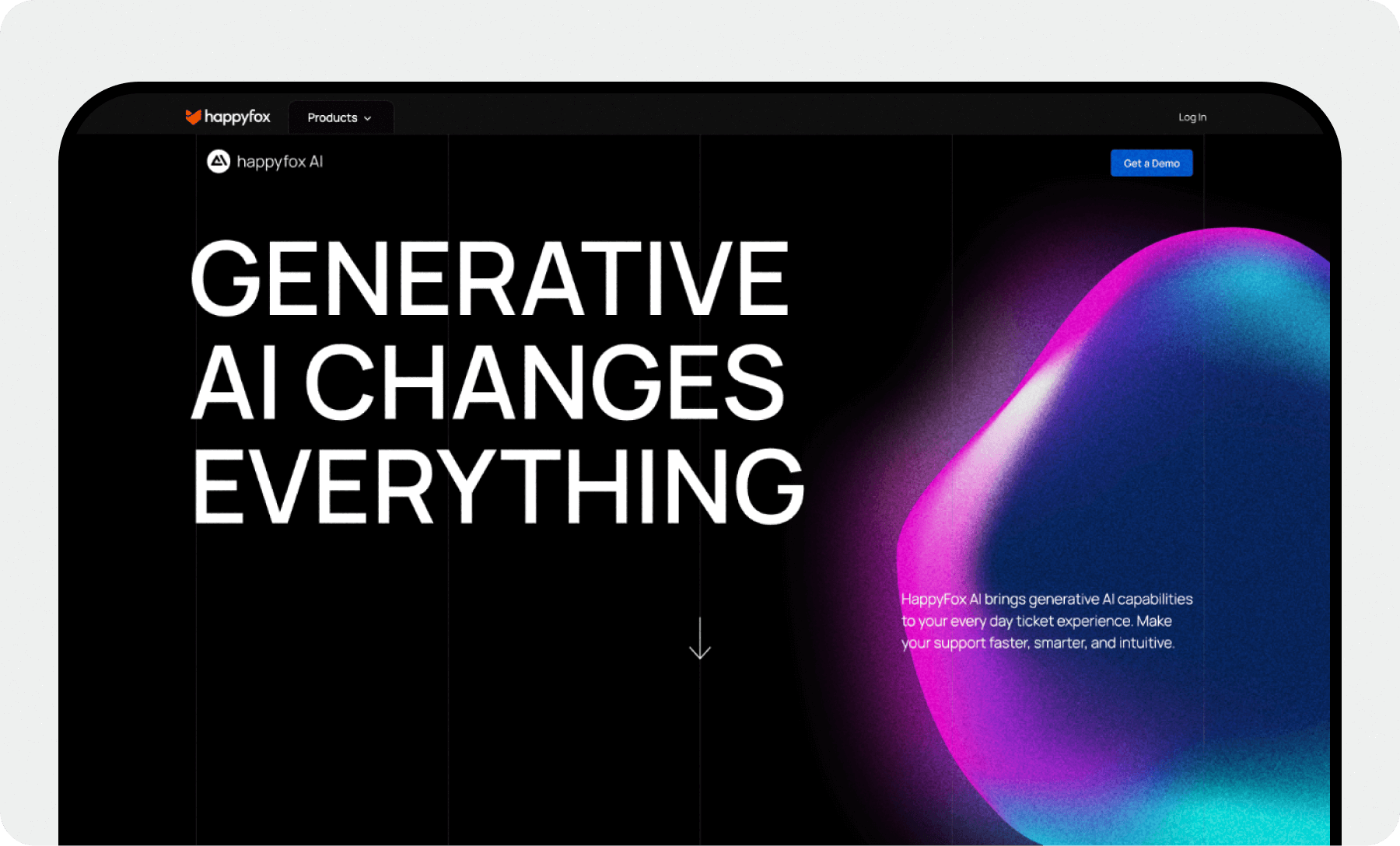
HappyFox AI leverages Claude, a LLM by Anthropic, to incorporate generative AI into their ticketing system. With three main features, this relatively new AI offering from the help desk solutions provider offers increasing levels of capability by tier. However, the true AI ticketing capabilities are only available to Premium plans and above.
Main features
AI Agent Copilot: Although this is not a true AI ticketing solution, this is a generative AI tool for human agents to help expedite their support process. It includes a writing assistant to help agents craft responses quickly, and it also recommends the best canned actions and knowledge articles.
AI Resolve: This feature provides quick, personalized answers to customer queries without needing tickets or long searches through knowledge bases.
AI Knowledge: An innovative feature, this tool can turn support tickets into comprehensive knowledge base articles. It identifies tickets that have knowledge base potential and generates rough drafts. Then the writing assistant can help you create polished articles from the drafts.
Pros
Automates routine tasks: Automates repetitive processes and significantly reduces the manual workload for customer service teams.
24/7 AI chatbot support: AI chatbots can handle common queries around the clock.
Sentiment analysis: Its ability to detect customer sentiment helps agents respond more appropriately, enhancing the customer experience.
Efficient workflow management: Automated workflows improve ticket handling, preventing tickets from slipping through the cracks and maintaining consistent service quality.
Scalable solution: The platform scales with businesses, allowing customer support teams to handle an increasing volume of tickets while maintaining response quality.
Improved analytics and insights: Provides data on ticket trends, agent performance, and customer satisfaction for ongoing improvements.
Cons
Appears not to be available to new customers yet. Interested parties can sign up for the waitlist
Full AI ticketing is not available on Standard or Pro plans
Does not offer a free trial
Customers complain about high costs compared to other platforms
Pricing
HappyFox AI offers four pricing tiers (their fees are all per agent, per month):
Standard ($14 per agent, per month): Includes Agent Copilot with 500 interactions per agent per month.
Pro ($19/agent/month): 1,000 interactions per agent per month, plus AI Insights and AI Knowledge features.
Premium ($29/agent/month): 2,000 interactions per agent per month, more AI Insights and Knowledge capabilities, and adds AI Resolve.
Enterprise ($39/agent/month): 10,000 interactions per agent per month, plus maximum levels of all the AI features.
4. Freshdesk
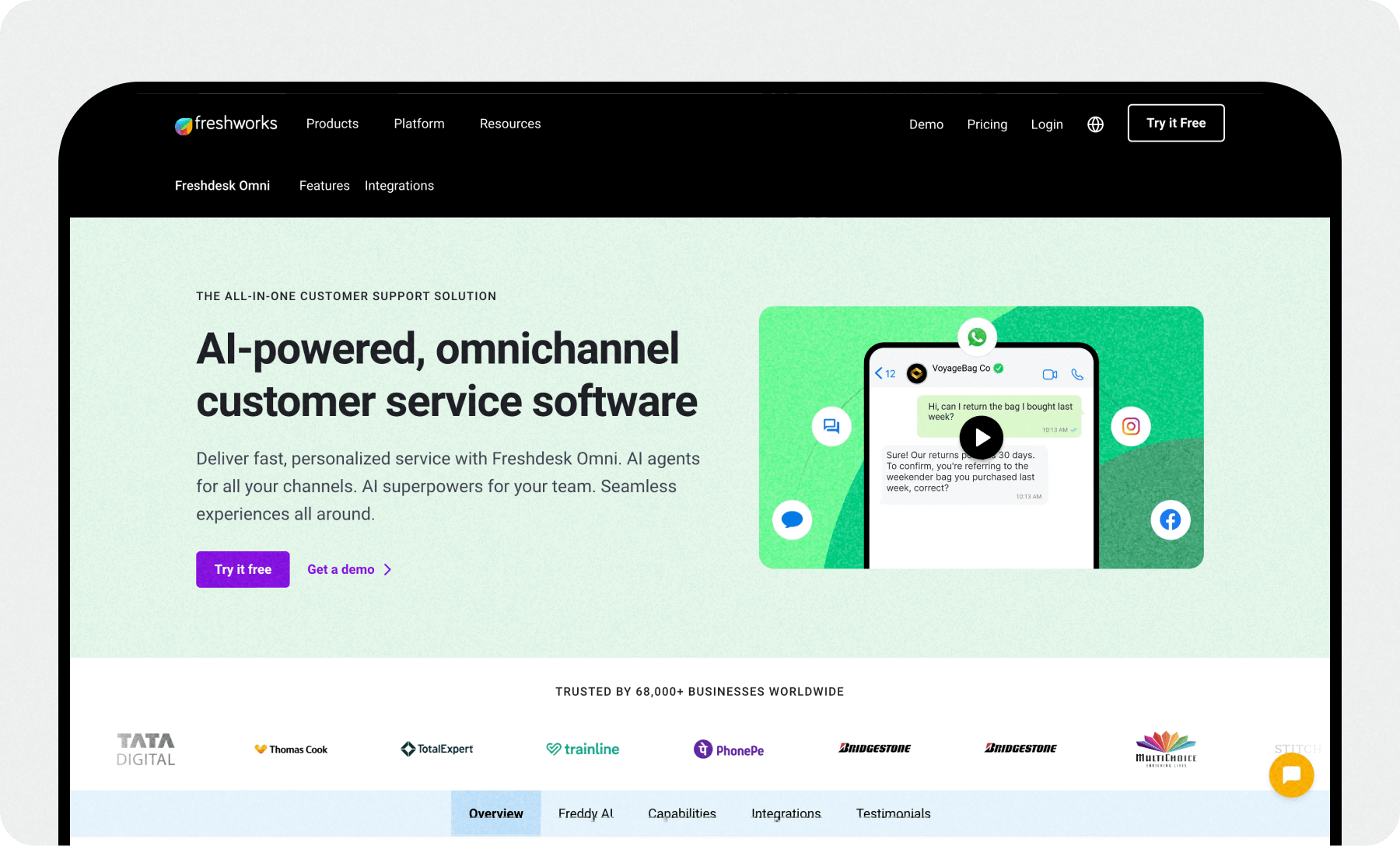
Freshdesk Omni, part of the Freshworks Customer Service Suite, is AI-powered omnichannel customer service software designed to help businesses quickly deliver consistent, personalized service across multiple channels. While its omnichannel solution is well-liked, users report its AI features to be underwhelming.
Main features
Freddy AI Assistant: This chatbot uses NLP (on Freshdesk’s own proprietary LLM) to automate responses to common customer queries, reducing the workload on human agents by handling repetitive tasks like answering FAQs or troubleshooting basic issues.
AI-powered ticketing: Advanced AI capabilities automatically categorize and prioritize tickets based on urgency and complexity.
Intent detection and sentiment analysis: Freddy Copilot, an AI coach, helps identify the nature of customer inquiries and their emotional tone, enabling agents to respond appropriately.
Self-service capabilities: Freddy Self-Service empowers users to resolve issues independently using AI-driven knowledge bases.
Customized analytics: Freddy Insights answers data-related questions and generates reports and dashboards.
Pros
Quick deployment: The system can be up and running in days
Scalability: The system is easy to customize as your business grows, without additional IT support
Customized AI: Freddy AI is native to the platform and trained specifically for customer service use cases
Out-of-the-box integrations: Connects with many popular tools and business apps without needing costly add-ons
Free trial: Test it out for 14 days, no obligation
Cons
Users have reported that the AI capabilities are not robust enough for the cost
Tool isn’t adequate for complex issue resolution
Will present a learning curve for human agents
While they are developing new AI capabilities, many are still in beta and need refining
Pricing
Access to full AI capabilities begins at the mid-tier (Pro) level at $69 per agent per month.
5. DevRev
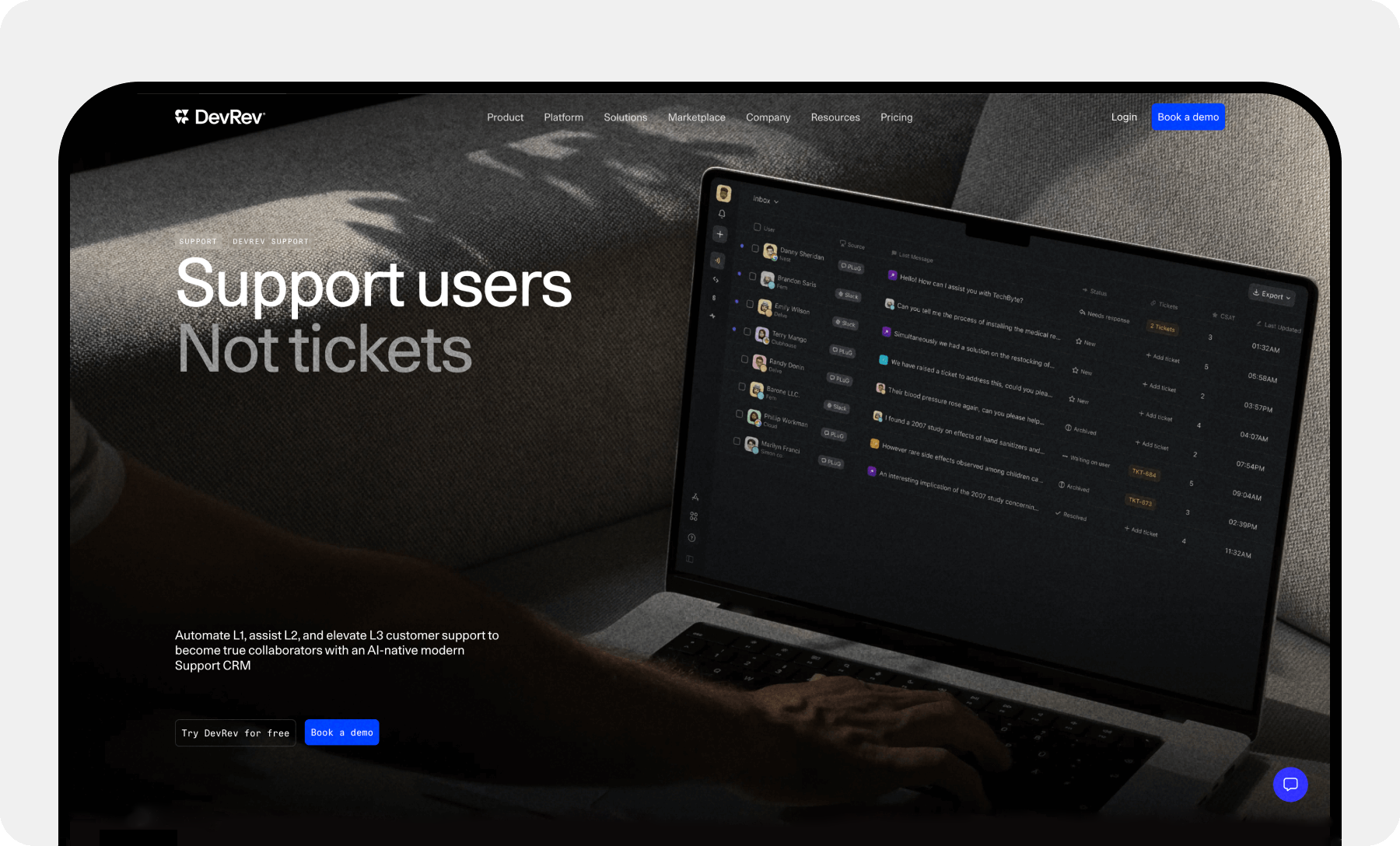
DevRev AI is a next-generation support platform that combines AI-powered automation with developer-centric features. It's built to streamline customer support, especially for API-first and tech-focused companies. The direct tie between customer support and product development is a notable differentiator from other AI ticketing systems.
Main features
Self-learning GPT-bot: An intent-aware chatbot that doesn't require manual training.
RAG (Retrieval-Augmented Generation): With RAG, this tool scrapes external sources to provide comprehensive answers without human intervention.
Proactive support: Offers in-app nudges to suggest fixes before issues arise.
Semantic search: Integrated into the in-app chat and customer portal for easy self-service.
Unified platform: Combines user chat and ticket management in one place.
AI-recommended actions: Suggests next best steps for resolving issues.
User session replays: Captures full context of user issues for better understanding.
Natural language automation: Create workflows using simple prompts instead of complex rules.
Pros
Reduced ticket volume: Proactive support helps prevent issues before they occur.
Developer-friendly: Designed with features specifically for tech companies and developers.
Unified data: Aggregates product, user, and support data in one place.
Customizable workflows: Goes beyond basic routing to assign tickets intelligently.
Analytics: Offers in-browser analytics for tracking performance metrics.
Cons
Complex setup for smaller teams may be overkill for non-tech businesses.
The integration of support and product development may require a learning curve for teams to fully leverage its capabilities.
Depends on accurate data to ensure effective routing and categorization.
The cost of implementing DevRev AI may be high compared to simpler AI ticketing solutions.
Pricing
DevRev offers three tiers for Support plans. The Starter plan at $19.99 per user per month offers AI agents, assistance, and deflection. The two higher tiers offer the same AI features from Starter, in addition to enhanced customizability, from object and data types to integrations and enterprise-grade security.

Empower your support agents with AI
Take the next step with AI ticketing
AI ticketing is helping businesses improve their customer service programs, offering faster response times, more efficiency, and increased customer satisfaction. AI ticketing systems address many of the challenges of traditional systems by reducing manual workloads, improving data visibility, and offering scalability.
For businesses in customer service-heavy industries like ecommerce, healthcare, and real estate, AI ticketing systems are critical to staying competitive and retaining customers. By integrating advanced features like NLP and machine learning, AI-powered ticketing systems automate tedious tasks so teams can focus on resolving complex issues and building stronger customer relationships.
If you’re curious about how AI concierges can help your business, explore Sendbird's AI customer experience platform to enhance operational efficiency. Design and test a custom solution using an intuitive AI agent builder and connect your CRM and other software with AI agent integrations.
Contact us today to get started!










